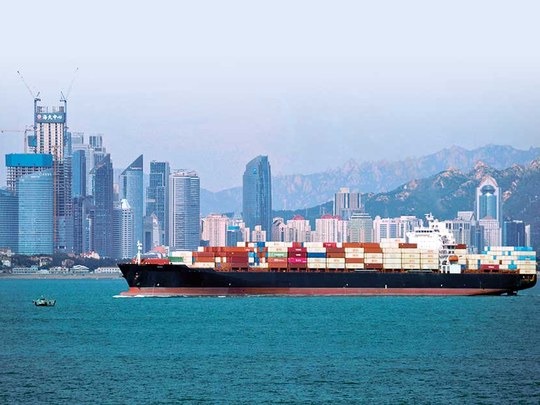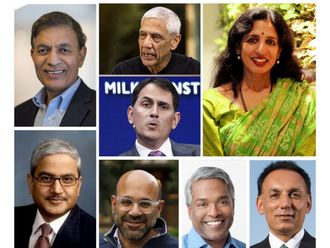
Washington/Beijing: A dock worker from the eastern port city of Ningbo said he wants China to stand unflinchingly against President Donald Trump’s demands.
A salesman in Beijing hopes his country will keep punching back in the commercial ring — even if it hurts his wallet.
And a coffee shop owner in the Chinese capital said Trump’s tariffs have inspired her to retaliate at the store: She’s swapping US products for Chinese brands.
Experts, meanwhile said that the trade war would negatively affect the interest of US consumers, companies, and the financial system of America.
But the whole gamut of arguments surrounding the so-called "trade imbalance" between the two top trading giants goes much deeper.
As the trade war between the world’s two largest economies unfolds on the international stage, analysts say Trump’s brash approach to try to win concessions from Beijing has provoked a public fury that could ultimately thwart his efforts.
By imposing tariffs on $200 billion (Dh734 billion) more in Chinese goods starting next week, Trump has triggered the likelihood of price increases for many American companies and consumers.
Beijing has said it will swiftly retaliate against American exporters — a move that stands to hurt US farmers and other companies that sell their products to China.
Beijing may also raise obstacles for US companies to do business in China.
Here’s a look at what’s happening and its likely impact:
What is the US doing?
The Trump administration will begin taxing $200 billion in Chinese goods starting from Monday. The tariffs will start at 10 per cent and rise to 25 per cent in 2019. The target list is huge, ranging from rattan mats to burglar alarms to bicycles. But the administration struck some items from the originally planned $200 billion tariff list, including bicycle helmets and other child safety products.
And, in a victory for Apple Inc, smart watches and some other electronics products won’t be subject to the new tariffs, either. The administration and Beijing have already imposed import taxes on $50 billion worth of each other’s products. Beijing’s target list of US goods to penalise was heavy on agriculture. That’s hardly a coincidence.
The United States has so far imposed tariffs on $50 billion worth of Chinese products. AP
Its tariffs are meant to deliver pain to American farmers, who overwhelmingly backed Trump in the 2016 election and whose interests are represented by powerful lobbyists and members of Congress. Exports to China account for about 60 per cent of the overseas sales of American soybean farmers, who stand to lose sales as a result of China’s tariffs.
What is behind the US-China trade rift?
The Trump administration has accused China of using predatory tactics in a lawless drive to overtake America’s technological supremacy. US officials point to Beijing’s long-range development plan, “Made in China 2025,” which calls for creating powerful Chinese entities in such areas as information technology, robotics, aerospace equipment, electric vehicles and biopharmaceuticals.
Foreign business groups argue that “Made in China 2025” is unfairly forcing them to the sidelines in those industries. The Office of the US Trade Representative concluded after an investigation that China’s tactics range from requiring US and other foreign companies to hand over technology in return for access to the vast Chinese market to outright cyber-theft. The US also asserts that Beijing uses state money to buy American technology at prices unaffordable for private companies.
How has China responded to the new tariffs?
China said on Tuesday that it has no choice but to retaliate against new US trade tariffs. The Chinese commerce ministry’s brief statement gave no details on China’s plans, but Foreign Ministry spokesman Geng Shuang said the US steps have brought “new uncertainty” to talks between the two countries.
“China has always emphasised that the only correct way to resolve the China-US trade issue is via talks and consultations held on an equal, sincere and mutually respectful basis. But at this time, everything the US does, doesn’t give the impression of sincerity or goodwill,” he added. Geng said he would not comment on “hypotheticals” such as what measures Beijing might consider apart from tariffs on US products, saying only that details would be released at the appropriate time.
What happens if China retaliates?
Trump warned on Monday that if China takes retaliatory action against US farmers or industries, “we will immediately pursue phase three, which is tariffs on approximately $267 billion of additional imports.” The latest US duties spared smart watches from Apple and Fitbit and other consumer products such as baby car seats.
A truck transports a shipping container at the cargo terminal port in Qingdao in east China's Shandong province. AP
But if the administration enacts the additional tariffs it would engulf all remaining US imports from China and Apple products like the iPhone and its competitors would not likely be spared. US Commerce Secretary Wilbur Ross said on Tuesday it was up to Beijing to decide the terms of any upcoming negotiations.
Isn’t the US also sparring with other trade partners?
Trump is battling in just about every direction. He has imposed tariffs on imported steel and aluminium — action that has drawn retaliatory tariffs from US allies like Canada, Mexico and the European Union. The president is also threatening to impose tariffs on imported vehicles and auto parts on the grounds that they pose a threat to America’s national security.
Trump also wants to replace the North American Free Trade Agreement, which includes the US, Mexico and Canada, with a new agreement that would shift more auto production to the US. The administration has already reached a deal with Mexico that excluded Canada. Talks to keep Canada in a North American trade bloc have been ongoing, with the two longtime allies divided over such issues as Canada’s dairy market and US efforts to shield drug companies from generic competition.
By brawling with America’s friends, critics say, Trump has squandered an opportunity to build a united front against China. After all, Europe, Japan and other rich countries have the same complaints about Chinese trade practices that America does.
Will Trump’s strategy help find a resolution soon?
“We are under no pressure to make a deal with China, they are under pressure to make a deal with us,” Trump tweeted last week. The change of tone effectively ties Chinese President Xi Jinping’s hands, said James Zimmerman, former chairman of the American Chamber of Commerce in China. “Getting the Chinese to the bargaining table should be all about face-saving — not a chest-thumping exercise,” Zimmerman said.
The Wall Street Journal has it wrong, we are under no pressure to make a deal with China, they are under pressure to make a deal with us. Our markets are surging, theirs are collapsing. We will soon be taking in Billions in Tariffs & making products at home. If we meet, we meet?
— Donald J. Trump (@realDonaldTrump) September 13, 2018
“Xi has no choice but to stand firm and stand tall.” There have been periodic reports that the Trump administration was on the verge of resuming talks with Beijing. Informal communications are still going on, administration officials have said, but no formal talks are scheduled.
Have there been trade wars before?
You’d have to go back to the 1930s to find anything close to the hostility between the US and its top trading partners right now. During the Great Depression, many countries, including the US, closed their markets to imports. A plunge in global trade likely worsened the Depression. Many less intense trade conflicts have followed.
President Ronald Reagan slapped tariffs on $300 million worth of Japanese imports in a dispute over the semi-conductor industry and strong-armed Tokyo into accepting limits on car shipments to the United States. In 2002, President George W. Bush imposed tariffs on Chinese steel. The move allowed US steel producers to increase prices, raising costs for companies that buy steel and pressuring them to cut back elsewhere. But the tariffs are thought to have cost significant US job losses.
Major reset ahead, Emirates chief says
US President Donald Trump’s trade battles and the accumulation of global debt to pre-financial crisis levels are among factors that will drive a major reset of the world economy in the next two to three years, according to the head of the world’s biggest long-haul airline.
“We have some extraordinary geopolitical forces at play,” Emirates chief Tim Clark told attendees at an aviation event in the Indian Ocean nation of Mauritius. The industry could be facing a “mini” global financial crisis within two to three years and “there is going be a major reset,” he added.
The US is set to impose tariffs on $200 billion of Chinese imports spanning bicycles and baseball gloves to digital cameras, two months after introducing a first round of levies. China has promised to respond in an ongoing tit-for-tat. The International Monetary Fund has warned that an escalating trade war could undermine the strongest global upswing in years.
There’s already intense competition in the Chinese market and declining passenger traffic from there to North America has prompted US airlines to withdraw from some core routes to the world’s second biggest economy. Air China has complained that subsidies for its rivals is distorting the market and lowering fares beyond what’s economically viable. Carriers will have to learn how to deal with dumping by heavily subsidised state-owned carriers, Clark added.
Alibaba’s Ma sees 20-year trade war
Beijing: Billionaire Jack Ma sent out a grave warning regarding the trade war between the US and China: It’s going to last longer and have a bigger impact than most people think.
China’s richest man said the dispute could last 20 years and persist beyond the presidency of Donald Trump, as the world’s two strongest economic powers battle for global supremacy.
China needs to strengthen its economy to deal with the conflict and shift trade relations from the US to regions like Southeast Asia and Africa, the chairman of Alibaba Group Holding Ltd. said during a speech at the company’s investor day conference in Hangzhou.
“Short term, business communities in China, US, Europe will all be in trouble,” Ma said, pacing a stage in an open white dress shirt and punctuating his remarks with forceful jabs. “This thing will last long. If you want a short-term solution, there is no solution.”
Ma said Alibaba will also be affected by the rising tensions, given its wholesale business allows American merchants to source products from China. But he also said the trauma will offer unprecedented opportunities for companies that can take advantage of them. “We should not focus on this quarter or next quarter or next year’s profit. This is a huge opportunity,” he said. “If Alibaba cannot sustain and grow, no company in China can grow. I’m 100 per cent confident in that.” Ma’s remarks carry particular weight because he is an icon of Chinese innovation and has been seen as an ambassador to the US. Last year, he met with Trump and promised to create 1 million jobs in the US through 2021.
5 ways Trump’s tariffs on $200b in China goods could be felt
By imposing taxes on an additional $200b in Chinese goods, President Donald Trump has intensified a battle of wills between the world’s two largest economies
Baltimore: By imposing taxes on an additional $200 billion (Dh734 billion) in Chinese goods, President Donald Trump has intensified a battle of wills between the world’s two largest economies — and the outcome is far from certain. Here is a look at five potential consequences:
Consumers
Unlike the first two rounds of tariffs totalling $50 billion, the new taxes launched by Trump would more directly hit American consumers. “As president, it is my duty to protect the interests of working men and women, farmers, ranchers, businesses, and our country itself,” Trump said.
Starting next Monday, the US is to begin charging a 10 per cent tax on thousands of Chinese imports — tyres, windshield wipers, baseball gloves, bicycles, snakeskin pants, backpacks, trombone cases, refrigerators and wooden furniture, among others. The list runs 194 pages. Unless the administration reaches a truce with Beijing, Trump’s import tax will jump to 25 per cent in 2019.
After Trump announced tariffs on washing machines toward the start of 2018, the price for laundry equipment shot up 16 per cent between February and May, according to an analysis by Mark Perry, an economics professor at the Flint campus of the University of Michigan.
Companies
Many companies have warned that Trump’s tariffs threaten to disrupt their businesses and depress their revenue. The monthly manufacturing index by the Institute of Supply Management noted that some companies have expressed concern about tariffs despite an otherwise robust US economy.
One food and beverage firm in the ISM survey said, “Suppliers appear to be bracing us for cost increases, given increased talk of tariffs and inflation.” Trump’s tariffs, with their uncertain duration, make it difficult for companies to plan for the future. Ted Murphy, a trade lawyer and a partner at Baker McKenzie, said the president is signalling that many companies will need to rethink their operations.
Financial Markets
So far, the stock market has taken the threats of tariffs in stride. Share prices have dipped, only to then resume their growth, in part because of deep corporate tax cuts that took effect this year and a solid US economy in its 10th straight year of expansion.
But the new round of tariffs risks triggering a more alarming response by investors. The additional taxes suggest that the two countries are struggling to make progress in settling their differences. “It’s definitely a setback for the market that they can’t seem to get to the table,” said J.J. Kinahan, chief market strategist for TD Ameritrade.
Global Economy
A prolonged trade war between the US, the world’s largest economy, and China, the second-largest, would ripple through the rest of the globe. Tariffs could translate into less trade, which could hinder growth in smaller nations. The US dollar has already begun to rise in value as trade tensions have mounted. This has insulated the United States from higher prices.
But the higher-valued dollar has also diminished the value of currencies of emerging markets – which has weighed heavily on their economies. In the meantime, the value of the Chinese yuan has dropped relative to the dollar, making it easier for Beijing to withstand US tariffs.
Politics
The Republicans’ control of the House and the Senate is at stake in the midterm congressional races in November. Trump has portrayed the import taxes as a winning electoral issue because they’re forcing other countries to compromise with the US. But public opinion suggests that his tariffs could prove a vulnerability.
A poll released August 24 by The Associated Press-NORC Centre for Public Affairs Research found that 61 per cent of Americans disapproved of the president’s handling of trade negotiations. If Democrats win, it would possibly repudiate Trump’s approach. But if many Republicans retain their seats, it could vindicate Trump’s choice to announce tariffs so close to the elections.
AP









